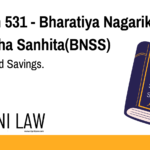Code: Section 149 BSA
When a witness is cross-examined, he may, in addition to the questions
hereinbefore referred to, be asked any questions which tend—
(a) to test his veracity; or
(b) to discover who he is and what is his position in life; or
(c) to shake his credit, by injuring his character, although the answer to such
questions might tend directly or indirectly to criminate him, or might expose or tend
directly or indirectly to expose him to a penalty or forfeiture:
Provided that in a prosecution for an offence under section 64, section 65, section 66,
section 67, section 68, section 69, section 70 or section 71 of the Bharatiya Nyaya Sanhita,
2023 or for attempt to commit any such offence, where the question of consent is an issue,
it shall not be permissible to adduce evidence or to put questions in the cross-examination
of the victim as to the general immoral character, or previous sexual experience, of such
victim with any person for proving such consent or the quality of consent.
Explanation of Section 149 BSA
Section 149 of the Bharatiya Sakshya Adhiniyam outlines the scope of permissible questions during cross-examination of a witness in criminal and civil trials. The primary purpose of this section is to allow the opposing party to challenge the credibility and reliability of the witness, which plays an important role in ensuring the fairness of the trial.
Key Provisions:
- Testing Veracity: A witness may be asked any questions designed to test their truthfulness or credibility during cross-examination.
- Discovering Witness’s Background: The cross-examining party may inquire into the witness’s background to understand their social position and context.
- Shaking Credit: A cross-examiner may ask questions that challenge the witness’s character, even if such questions could expose the witness to potential penalties or criminal charges.
- Limitation on Questions Regarding Consent: In specific cases, such as those related to offenses under the Bharatiya Nyaya Sanhita 2023, where consent is an issue, the character or previous sexual history of the victim cannot be used to challenge the consent. This is especially relevant in cases involving sexual offenses.
Illustration
Example 1: Testing Veracity
In a case where a witness claims to have seen the accused at the scene of the crime, the defense might cross-examine the witness about their ability to see clearly at that time. This question tests the witness’s veracity.
Example 2: Shaking Credibility
A defense lawyer may ask a witness about their past criminal record in an effort to undermine their credibility, even if this could indirectly expose the witness to legal consequences. This is permissible under Section 149.
Example 3: Consent and Sexual Offenses
In a case involving sexual assault, the defense may not question the victim about their previous sexual experiences or immoral character in order to challenge the consent. Section 149 protects the dignity of the victim by excluding such lines of inquiry.
Common Questions and Answers on Section 149 BSA
- What types of questions can be asked during cross-examination under Section 149? Under Section 149, a cross-examiner can ask questions that test the witness’s truthfulness, explore their background, or question their character to weaken their credibility.
- Are questions regarding a victim’s sexual history allowed in sexual offense cases? No. In cases where consent is an issue in sexual offense trials, questions about the victim’s previous sexual experiences or character are not permissible, as specified in the proviso of Section 149.
- Can questions that could incriminate the witness be asked? Yes. Questions that may tend to incriminate the witness or expose them to a penalty or forfeiture are allowed, as long as they serve the purpose of challenging the witness’s credibility or veracity.
- How does Section 149 protect the rights of victims in sexual offenses? Section 149 ensures that the character or sexual history of a victim is not used to undermine their testimony or consent in sexual offense cases, protecting the victim from further harm during cross-examination.
Conclusion
Section 149 of the Bharatiya Sakshya Adhiniyam ensures that cross-examinations remain fair and balanced. While it permits a broad scope for questioning witnesses to test their truthfulness and character, it also safeguards victims in sexual offense cases by limiting questions about their sexual history. This section strikes a balance between the need to challenge witness testimony and protecting the dignity and rights of individuals involved in sensitive cases.
For a detailed legal understanding, case studies, and more insights, visit ApniLaw.








